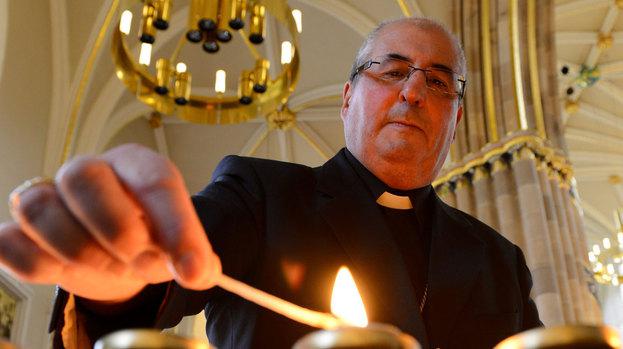|
Catholic Church in Scotland 'should apologise to survivors of abuse'
By Cara Sulieman
Scotland's most senior Catholic Archbishop has apologised to survivors of abuse within the church in Scotland following the publication of an independent review of its handling of allegations. The McLellan Commission was set up in November 2013 to evaluate the procedures in place to protect vulnerable children and adults. It published its findings on Tuesday, with a total of eight recommendations. The Very Rev Andrew McLellan, a former moderator of the General Assembly of the Church of Scotland who led the inquiry, told a press conference in Edinburgh an public apology should be made. Archbishop Philip Tartaglia, president of the Bishops' Conference of Scotland, issued the apology in his homily during a mass at St Andrew's Cathedral in Glasgow on Tuesday afternoon. He said: "As the president of the Bishops' Conference, and on behalf of all the Bishops of Scotland, I want to offer a profound apology to all those who have been harmed and who have suffered in any way as a result of actions by anyone within the Catholic Church. "Child abuse is a horrific crime. That this abuse should have been carried out within the Church, and by priests and religious, takes that abuse to another level. "Such actions are inexcusable and intolerable. The harm the perpetrators of abuse have caused is first and foremost to their victims, but it extends far beyond them, to their families and friends, as well as to the church and wider society." Dr McLellan said there was "no doubt" the Catholic Church put protecting its reputation and offenders before the needs to abuse victims. He said: "Support for the survivors of abuse must be an absolute priority for the Catholic Church in Scotland. "The Bishops' Conference of Scotland should make a public apology to all survivors of abuse within the church. An apology must be made in a way that is unmistakeable and unequivocal." "The Bishops have said from the outset that they will accept our recommendations. That means that three things will happen. "First and most important a beginning will be made to heal the hurt and address the anger which so many survivors feel. "Second, the Catholic Church in Scotland will begin to confront a dark part of its past and find some healing for itself. "Third, a significant step will be taken in restoring public credibility for the Catholic Church." "Our report gives the Catholic Church a chance - an unrepeatable chance - to make things better. "If this opportunity is not taken, survivors will know there is no hope left for them within the Catholic Church in Scotland. If this opportunity is not taken, many Catholics who are longing for a new beginning will feel betrayed by their church. If this opportunity is not taken, the public credibility of the Catholic Church in Scotland will be destroyed. "I believe our report gives the Bishops the beginning of a way to change. The way to change which they all say they want - from secrecy to openness, from systems which allow evil to survive to systems which ensure that good is done." The eight recommendations made in the report are:
The report contains detailed information on the changes needed to make sure the recommendations happen and each is measurable. Dr McLellan said: "There is unanimous agreement among members of the Commission about our eight recommendations. Nothing in our independent report is more important than our first recommendation: that support for the survivors of abuse must be an absolute priority for the Catholic Church in Scotland. "The Report has recommendations which can be measured. One year from now, or three years from now, the Catholic Church will be able to demonstrate how much progress has been made against our recommendations. "This is the greatest challenge facing the whole Catholic Church in Scotland. Change will come when the whole membership of the Church own this desire for change and embrace the agenda set out in our report. If the Catholic Church in Scotland grabs this opportunity, then the Church will be a safer place for all." The commission was set up in November 2013 by the Bishops' Conference of Scotland in response to a series of scandals, including the resignation of disgraced Cardinal Keith O'Brien. He stepped down from the archdiocese of St Andrews and Edinburgh in February 2013 after three priests and a former priest made allegations of inappropriate behaviour against him. Its members included Malcolm Graham, assistant chief constable of Police Scotland, Ranald Mair, chief executive of Scottish Care, and Kathleen Marshall, former Commissioner for Children and Young People. Alongside the review, the Catholic Church in Scotland published details of diocesan safeguarding audits from 2006 to 2012 giving a breakdown of incidents reported during that time. A total of 46 allegations were made, of which 55% related to sexual abuse, 19% to physical abuse, 11% were allegations of verbal abuse and 15% were in connection with emotional abuse. Of those accused, 56% were priests, 22% were volunteers, 11% were parishioners and the remainder were staff or other people connected to the church. There have been no prosecutions in relation to 61% of all cases reported, the church said. It also announced that a review of all cases of historic abuse allegations between 1947 and 2005 will be published at a later date.
|
.
Any original material on these pages is copyright © BishopAccountability.org 2004. Reproduce freely with attribution.
